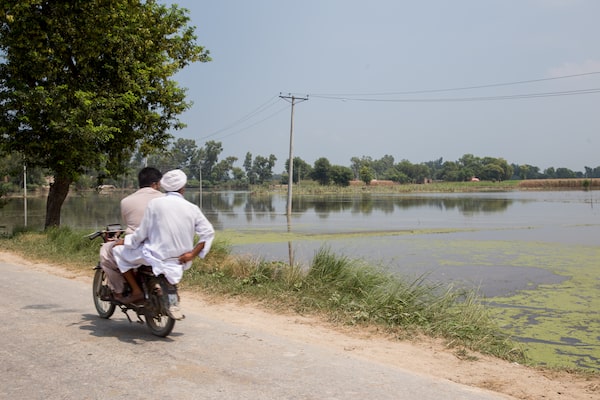
Farmers from Pakistan's Kasur district begin to return to their villages on Aug. 28, a week after their fields were inundated by monsoon rain water released from an Indian dam upstream.Photography by Salmaan Farooqui/The Globe and Mail
The water stretches as far as the eye can see from Mirza Mukhtiar’s front yard, forming a river wider than a four-lane highway where his field of crops used to be.
All of it is floodwater that overflowed into Pakistan last month after an Indian dam upstream released a buildup of water from monsoon rains.
“All our crops, all of our feed for cattle, whatever food that we had to eat has been ruined,” Mr. Mukhtiar said last month from his village in the Kasur region of Punjab. He was with a group of his neighbours, many of whom are returning to their homes after a week in emergency camps to survey the damage. They didn’t have much else to do but sit in the shade and smoke from a hookah after seeing the extent of their loss. “It’s going to take at least three months for us to begin setting up our land again. … All the money we’ve spent on our farm has gone to waste.”
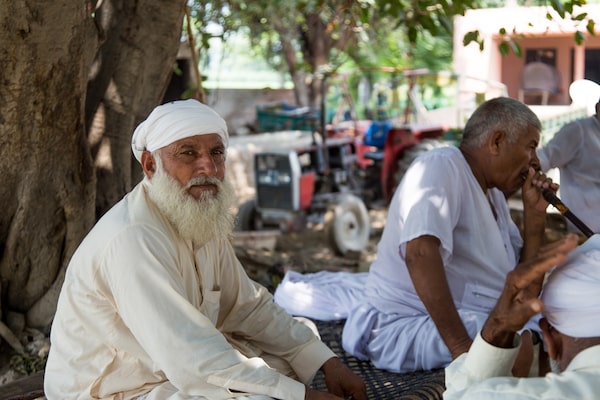
Farmers Mirza Mukhtiar and Muhammad Shaid sit in front of their homes and smoke from a hookah after returning to find their fields destroyed.

AFGHANISTAN
Islamabad
Kasur
Detail
PAKISTAN
INDIA
New
Delhi
0
300
KM
INDIA
Sehjra
Chaant
Sutlej River
Shaikpur
Kuhna
PAKISTAN
0
3
KM
MURAT YÜKSELIR / THE GLOBE AND MAIL, SOURCE:
TILEZEN; OPENSTREETMAP CONTRIBUTORS; HIU;
GOOGLE MAPS

AFGHANISTAN
Islamabad
Kasur
Detail
PAKISTAN
INDIA
New
Delhi
0
300
KM
INDIA
Sehjra
Chaant
PAKISTAN
Sutlej River
Shaikpur
Kuhna
0
3
KM
MURAT YÜKSELIR / THE GLOBE AND MAIL, SOURCE:
TILEZEN; OPENSTREETMAP CONTRIBUTORS; HIU; GOOGLE MAPS

INDIA
Sehjra
Islamabad
AFGHANISTAN
Chaant
Kasur
PAKISTAN
Sutlej River
Detail
PAKISTAN
New Delhi
Shaikpur
Kuhna
INDIA
0
3
0
300
KM
KM
MURAT YÜKSELIR / THE GLOBE AND MAIL, SOURCE:
TILEZEN; OPENSTREETMAP CONTRIBUTORS; HIU; GOOGLE MAPS
There was flooding along the Sutlej River in both India and Pakistan, but the incident has sparked outrage among Pakistani government officials and local farmers, who say they weren’t warned about the release of dam water on the Indian side of the border. Pakistani officials have said India is actively causing problems with Pakistan’s water supply, at a time of worsening relations in the wake of India’s month-long security lockdown and communications blackout in Indian-administered Kashmir.
The Indus Waters Treaty has long been a contentious issue between India and Pakistan, and threats over water supplies have been made when relations are at their worst. The treaty was negotiated in 1960 to dictate how water from the Indus River network is shared between the two countries.
In February, the Indian Transportation Minister threatened to stop sharing excess river water with Pakistan after an attack by a Pakistan-based militant group killed 40 Indian paramilitary police the same month.
India’s lockdown on Kashmir came at the same time as its decision to strip the region of its many rights to autonomy, a move that Pakistani Prime Minister Imran Khan and his government have heavily criticized.
While Pakistani and Indian officials don’t specifically acknowledge any connection between the dam release and tensions over Kashmir, the farmers who have been affected believe the events are related.
“It happened all of a sudden, and this is the first time water like this has flooded our land in three years,” said Zubair Ahmed, a resident in the Kasur region who was on his way to an emergency medical camp because his son had an ear infection after the floods. He said previous floods were also a result of a water release from an Indian dam.
“They purposefully released the water here. India has done this because of Kashmir.”
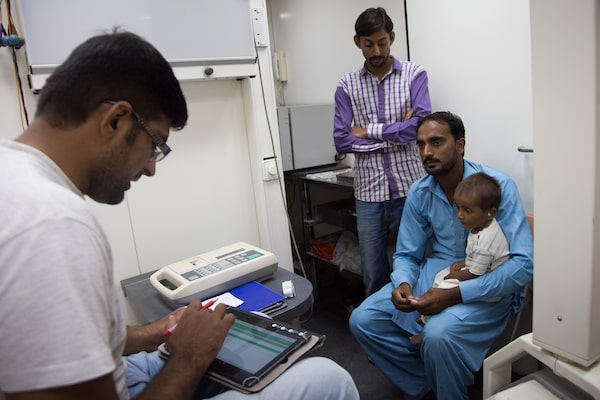
Zubair Ahmed sits in an emergency medical camp where his son, who has an ear infection, was one of many suffering from illnesses related to the floods.
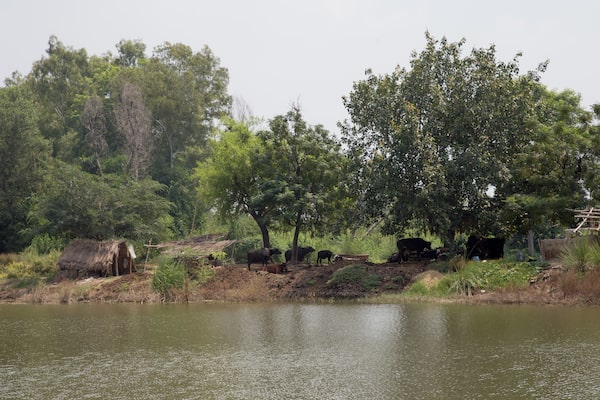
Cattle were stranded on the far side of floodwaters for days. Locals were reluctant to cross the water and retrieve them, fearing they would get sick too.
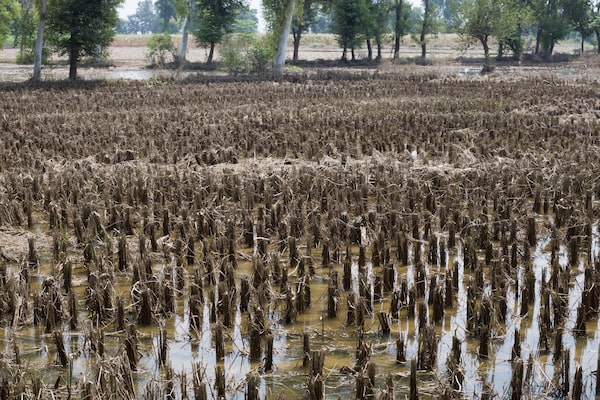
A field of ruined crops in Kasur. Planting new crops is an added financial burden that, for many locals, is out of reach – and some blame on the escalating tensions between Pakistan and India over the Kashmir region.
‘They feel happy to cause trouble’
When the water first started rushing to Pakistan, the director of Punjab’s disaster-management agency only found out from an Indian TV broadcast that was spotted by one of his staff.
“It was just by chance that we saw this video clip, and we were put on alert by ourselves,” said Tariq Masood Farooq, director of the Provincial Disaster Management Authority in Punjab. He said his agency had to scramble to evacuate more than 20,000 people and set up more than 150 relief and medical camps. One person died and 48 were injured as a result of the flooding.
“Had we been informed in advance by India, whether they were going to release extra water, we would have prepared ourselves in a better manner and a lot of hassle and damage could have been avoided.“
Mr. Farooq said his agency has tried to discuss its complaints over communication in the past, but a consistent state of animosity between the two countries prevented them from finding a solution.
“They feel happy to cause trouble in Pakistan,” he said. “So they enjoy when they see the flooding in Pakistan.”
The Indian Foreign Ministry rejected Mr. Farooq’s claims, maintaining that the Indian government is fully compliant with the Indus Waters Treaty. “To the best of my knowledge, we have been sharing the [water release] data,” said Raveesh Kumar, spokesman for India’s Ministry of External Affairs, in an e-mail. “India is fully compliant with all the provisions of the Indus Water Treaty. ... There is a mechanism of Indus Commissioners who remain in touch on a regular basis.”
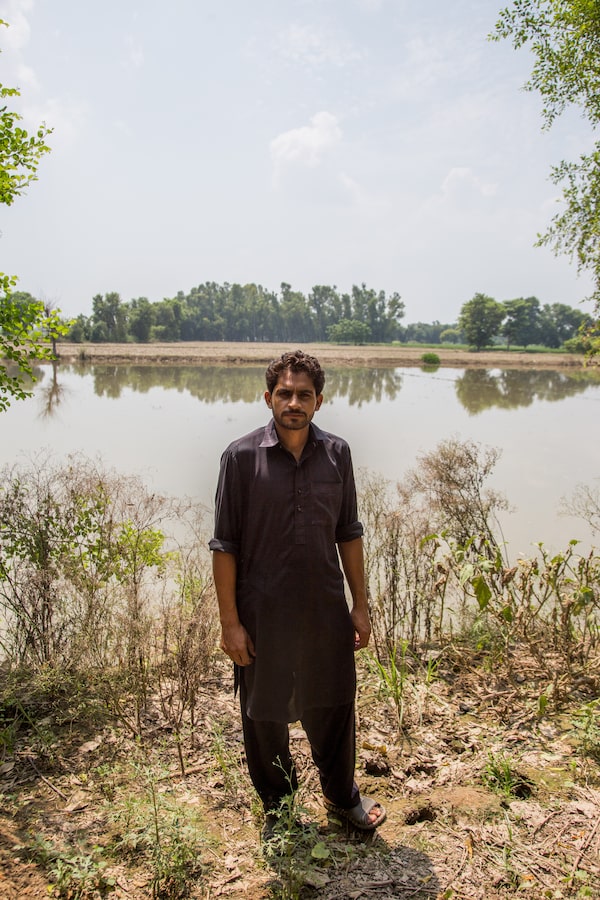
Majid Hussain stands in front of his flooded field in Kasur.
‘We will never leave this land’
The remnants of previous conflicts in the region are visible in the villages of Kasur. The main roads connecting communities are lined with bunkers that were developed during wars between India and Pakistan.
The entire country goes tense with any significant development in Kashmir, but perhaps nowhere more than regions such as Kasur, where threats over the Indus Waters Treaty have a direct impact on people’s livelihood. “Each acre of ruined land represents 15,000 to 20,000 rupees (approximately $130 to $170) in damages,” said Muhammad Shaid, another farmer from the same village as Mr. Mukhtiar. “Then we’ll have to spend all that money all over again, and to do that we’ll have to sell some of our possessions because for us, it’s a necessity to plant again.”
But the cost to buy new crops and replant is out of reach for many locals. The loss, combined with the spread of illness in the area, left people agitated throughout the region.
Mr. Shaid was also convinced that the floods were connected to Kashmir. “But they can drop as much water on us as they like, we will never leave this land,” Mr. Shaid said. “We’re not afraid of India. We’ve fought three wars and I’ve even seen them myself, I’ve heard the sounds of gunfire and seen people die.”
Pakistani citizens have been vocal about their opposition to India’s clampdown on Kashmir. On Aug. 30, people across the country observed a “Kashmir solidarity hour,” where traffic lights turned red to stop vehicles for half an hour in a gesture aimed at Kashmir and the international community. Mr. Khan, the Prime Minister, led a demonstration in Islamabad the same day, saying the Pakistani people supported the struggle of Kashmiri people.
Chants about freedom for Kashmiri people can be heard throughout the day on TV and radio broadcasts and even by children. In Kasur, farmers also widely expressed their support for the people in Indian-administered Kashmir. But the losses they believe they’ve faced at the hands of India have left them with their own sense of anger. “We believe, by Allah, that the losses they’ve tried to inflict on us will be multiplied on them,” Mr. Mukhtiar said. “When you inflict pain on others, it’ll return onto you.”
 Salmaan Farooqui
Salmaan Farooqui